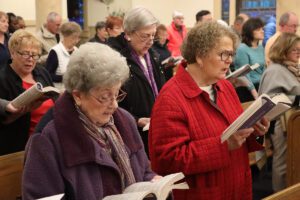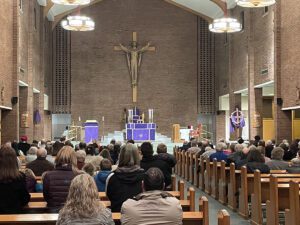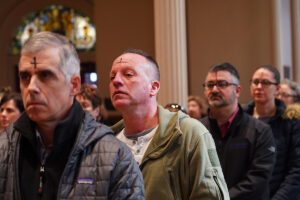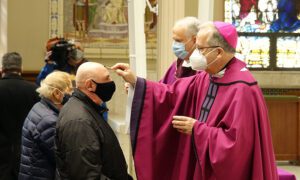LARKSVILLE – As the month of March ended, so too did a series of 12 Lenten Holy Hours celebrated by the Most Rev. Joseph C. Bambera, Bishop of Scranton.
Beginning at Saint Rose of Lima Parish in Carbondale Feb. 23 and ending at Saint John the Baptist Parish in Larksville March 29, Bishop Bambera joined the faithful of each deanery to proclaim and adore the presence of Jesus in the Sacrament of the Holy Eucharist.

Hundreds of faithful attended each of the Lenten Holy Hours – meaning overall that several thousand people experienced the love of Jesus poured forth from the Cross.
Organized to help highlight the National Eucharistic Revival that has been underway for nearly one year – the Lenten Holy Hours were a time for the Church to discover anew the life-giving strength of the Eucharist – the living presence of Jesus among us.
During his homily at each stop, Bishop Bambera emphasized three important realities that he hoped the faithful would take from each Holy Hour.
First, through the Eucharist, we learn that we are incorporated into Christ’s Paschal Mystery – His suffering, death and resurrection – through which we are saved.
Bishop Bambera stated,
“‘For as often as you eat this bread and drink this cup,’ Saint Paul reminds us, ‘you proclaim the death of the Lord until he comes.’ What does that mean for us? It means that we do not suffer alone, for Christ suffers with us. It means that the deaths that we experience are known and grieved by Christ. It means that like Jesus who rose, despite our suffering and deaths, we have hope for new life in this world and the world to come.”
“But to make this mystery our mystery, Christ, in the Eucharist, first beckons us to remove the facades that we so often use to mask our troubles and disappointments, our suffering and pain, our failures, sins and death and to come to him as we are to be forgiven, healed and created anew through the power of his resurrection. His death is our death. His rising to new life is our rising as well.”
Second through the Eucharist, we are bound together as brothers and sisters.
Bishop Bambera continued,
“Recall the words of Pope Benedict in this first encyclical, Deus Caritas Est, ‘I cannot possess Christ just for myself … Communion draws me out of myself towards him and thus also towards unity with all Christians.’ That means that while the love of God given to us through Christ is without conditions, it is not without consequences. Communion with the Eucharistic body of Christ must be accompanied by our communion with the mystical body of Christ, which is the Church – our brothers and sisters.”
Third, Through the Eucharist, we are sent forth on mission – to be the living presence of Jesus in our world today.
The bishop noted,
“Saint Paul challenges the Corinthians, ‘You who share the same bread and cup receive the same Christ in the Eucharist, and as such, you become one with each other and with the Lord whom you receive.’ You become one with your husband, your wife; one with your child; one with the neighbor you find intolerable; one with the person of color or ethnic background or lifestyle that you’d rather not accept; one with the poor.”
“Eucharist compels us, brothers and sisters, to remember that we not only receive the risen Christ but also are called to something more. Early in his pontificate, Saint John Paul II wrote to the bishops of the world about the gift of the Eucharist. As he spoke of the sublime gift of God in the sacramental presence of Jesus that we honor and adore this night, he also said this: ‘The authentic sense of the Eucharist is that it becomes the school of active love for my neighbor. If authentically received, Eucharist must make us grow in awareness of one another.’”
As he concluded his remarks each evening, Bishop Bambera told the faithful there is nothing that cannot be forgiven and healed by Jesus.
“Allow his mercy and forgiveness to envelop your lives and to recreate your spirits,” Bishop Bambera ended by saying. “Trust in His promise to save. Open your hearts and let His love fill you with peace. Receive Christ and then, filled with His life, become Christ for our broken world.”
To read Bishop Bambera’s full homily from the Lenten Holy Hours, visit the Bishop’s Office page here on the Diocesan website.



